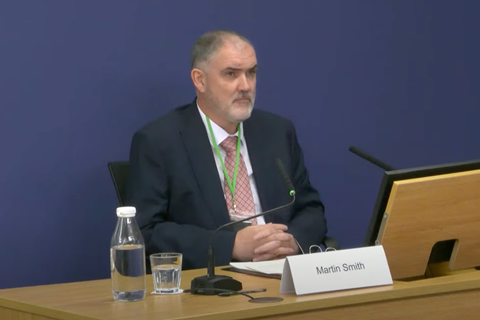A former solicitor advising the Post Office has denied that disclosure refusals were a tactic to stop sub-postmasters being able to defend themselves.
The public inquiry heard yesterday that the Post Office repeatedly delayed or denied requests from solicitors acting for Khayyam Ishaq, who ran a branch in Kirklees. He was convicted and jailed for 54 weeks before his conviction was overturned eight years later.
The inquiry heard that Martin Smith, an associate with Post Office firm Cartwright King, rejected Ishaq’s lawyers’ disclosure requests on the grounds they were not specific enough. The Post Office would repeatedly respond to such requests by asking for details of what data the defence wanted about the Horizon system that was used to convict Ishaq and hundreds of others.
Smith said a ‘robust’ stance was taken because he had been continually assured by the Post Office that Horizon data was reliable.
In an email from September 2012, Smith said the defence were ‘clearly aware of the current Horizon issues and are on a fishing expedition. This in my view is a red herring.’
Another pre-trial note showed showed Smith advising the lawyer to make clear that Horizon worked and that it was the defence’s job to particularise problems with the system in order to secure disclosure.

The inquiry saw another internal email from Smith which said defendant solicitors were ‘grumbling about disclosure and the lack of information’. He admitted in his oral evidence that grumbling was an ‘inappropriate word’ and he would have rephrased it looking back. ‘They [the defence solicitors] were quite frankly right weren’t they,’ conceded Smith.
In June 2013, two months after Ishaq was convicted, Smith and his colleague Simon Clarke spoke with expert witness Gareth Jenkins in a conversation that was recorded and the transcript shown to the inquiry.
The Horizon expert told the lawyers ‘you can never say there are no more bugs in the system so we’ve got to be careful about trying to say anything like that’.
Clarke asked to clarify whether prosecutors could not rule out there might be other problems with Horizon. Jenkins replied: ‘Yes.’
This was evidence which fundamentally undermined the basis for many Horizon-based convictions and Smith said he was concerned that the presence of bugs in the system had not been raised before. ‘I was quite upset about the position there had been bugs that had not been disclosed in Mr Ishaq’s case,’ he told the inquiry. ‘I remember being frankly quite angry about that because a man had gone to prison.’
Around the same time as the Jenkins admission, forensic accountants Second Sight and an internal Post Office review cast more doubt on the reliability of Horizon.
Following this, Cartwright King wrote to Ishaq’s solicitors saying ‘we have formed the firm view that, had the prosecution been possessed of the material contained within the two reports during the currency of the prosecution of your client, we should and would have disclosed that material to you in compliance with our disclosure duties.’






























